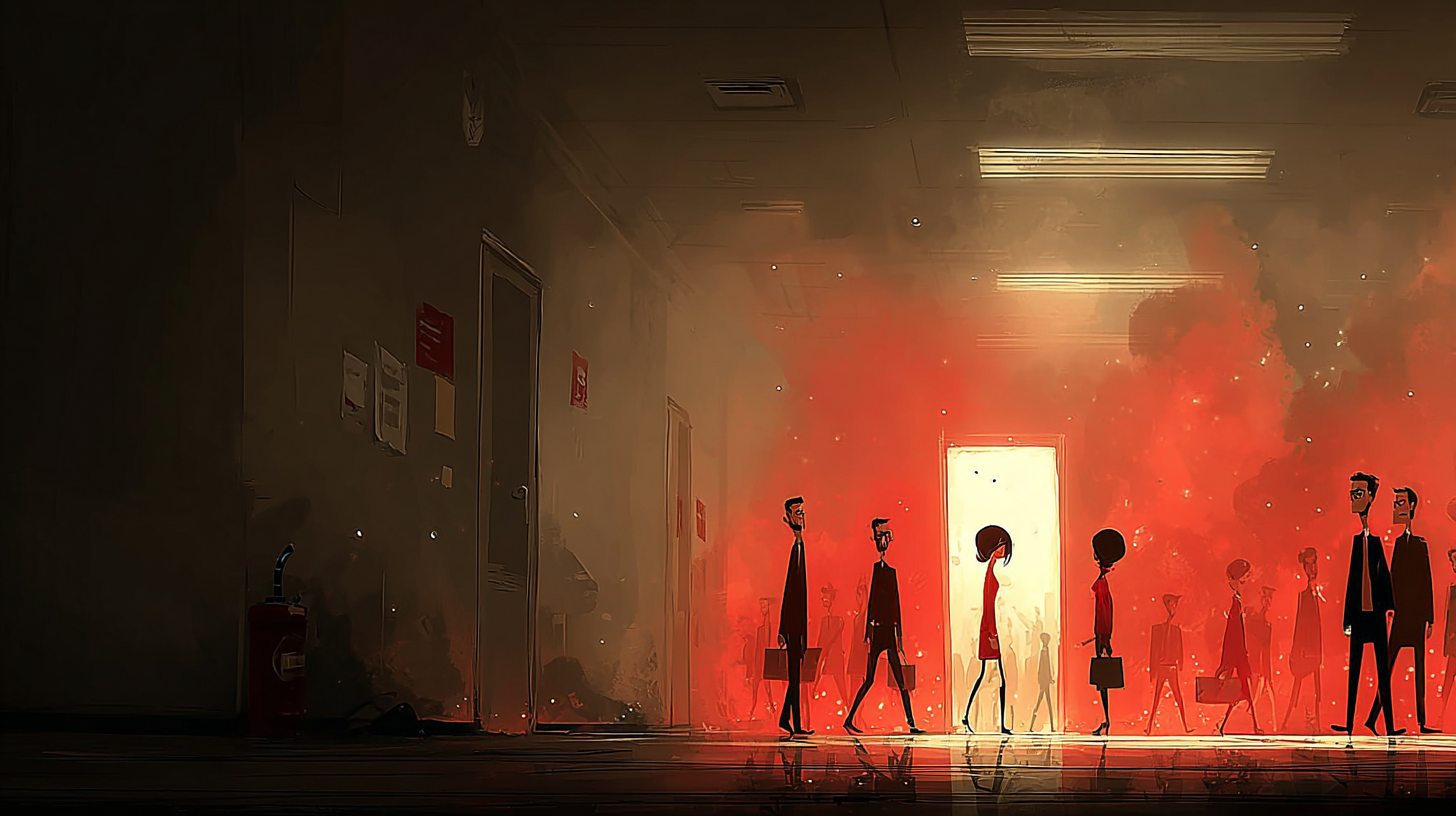“A very bad event like an earthquake or a big mistake.”
「とても悪いことが起きること。たとえば、地震や大きな失敗。」
以下は英単語 “disaster” に関するストーリー型学習コンテンツです。まずは大枠の意味を理解して最後の文章で確認しましょう。
主な意味(main meaning)
| 品詞 | 意味 | 発音記号 | 英語例文 |
|---|---|---|---|
| 名詞 | 大きな災害、取り返しのつかない失敗 | /dɪˈzæstər/ | The earthquake was a terrible disaster that destroyed many buildings. |
語源(etymology)
“disaster” はラテン語の “dis-“(否定) + “astro”(星) に由来し、「悪い星の影響で起こること」という意味がありました。つまり「星のせいで悪いことが起きる」というのが元のイメージです。
類義語(synonyms)
| 類義語 | 英語例文 |
|---|---|
| catastrophe | The flood turned into a national catastrophe. |
| calamity | The fire was a calamity for the whole town. |
| tragedy | Losing their home was a personal tragedy for the family. |
| misfortune | He suffered a great misfortune when he lost his job. |
| accident | The train accident caused serious delays. |
反義語(antonyms)
| 反義語 | 英語例文 |
|---|---|
| success | The event was a great success despite the rain. |
| blessing | Getting the job was a real blessing for her family. |
コロケーション(collocations)
| コロケーション | 英語例文 |
|---|---|
| natural disaster | A tsunami is one example of a natural disaster. |
| disaster strikes | When disaster strikes, people need help quickly. |
| prevent a disaster | Emergency drills can help prevent a disaster. |
| disaster area | The whole town was declared a disaster area. |
| disaster relief | Many countries offered disaster relief after the earthquake. |
2項表現(binomials)
| 表現 | 英語例文 |
|---|---|
| death and disaster | The war brought death and disaster to the region. |
| fire and flood | The area was damaged by both fire and flood. |
英語ストーリー(english story)
Title: The Unexpected Drill
It was a regular Tuesday morning at Tom’s office. He was working on a report when suddenly, the building shook. At first, he thought it was a small accident, but soon the fire alarm started ringing. “This must be a disaster drill,” someone said. However, when they looked outside, they saw smoke rising from a nearby building.
Everyone stayed calm, thanks to the regular emergency drills the company had practiced. These drills were designed to prevent a disaster during real emergencies. The workers quickly followed instructions and moved to the disaster area to help those affected.
Luckily, it was a small fire and no one was seriously hurt. Still, it was a reminder that disaster can strike anytime.
After everything was under control, the manager gave a short speech. “This could have been a catastrophe, but thanks to your calm actions, we avoided a tragedy. Today was not a calamity, but a success.”
Tom went home that night feeling proud. He remembered how fire and flood, or even a small mistake, could lead to death and disaster. But with teamwork and training, even the worst situations could turn into a blessing.
和訳
タイトル:思いがけない避難訓練
火曜日の朝、トムはいつものように職場で報告書を作成していました。すると突然、建物が揺れました。最初は小さな**事故(accident)**だと思いましたが、すぐに火災報知器が鳴り始めました。「これは避難訓練に違いない」と誰かが言いました。しかし、窓の外を見ると近くのビルから煙が上がっていたのです。
みんなは落ち着いて行動しました。会社が定期的に行っていた訓練のおかげで、実際の非常時にも**災害を防ぐ(prevent a disaster)ことができたのです。社員たちはすぐに指示に従い、被害を受けた災害地域(disaster area)**へと移動しました。
幸い火事は小規模で、大きなけが人も出ませんでした。それでも、「災害は突然やってくる(disaster strikes)」ということを思い出させる出来事でした。
すべてが落ち着いた後、マネージャーが話しました。「今回のことは**大惨事(catastrophe)になる可能性もありましたが、みなさんの冷静な行動で悲劇(tragedy)を避けられました。今日は災難(calamity)**ではなく、**成功(success)**です。」
その夜、トムは誇らしげな気持ちで帰宅しました。火や洪水(fire and flood)、ちょっとしたミスでも**死と災害(death and disaster)を招くことがあります。でも、チームワークと準備があれば、最悪の状況も恵み(blessing)**に変えられるのです。
Q&A
- Q「disaster」と「catastrophe」の違いは?
- A
どちらも「大きな災害」や「ひどい出来事」を意味しますが、「catastrophe」は「壊滅的で取り返しのつかない被害」を強調する時に使われます。
例:地震で町全体が壊れた → catastrophe(より深刻)
- Q「disaster」と「calamity」の違いは?
- A
「calamity」は、文語的でやや古風な響きがあり、深刻だが感情的・文学的なニュアンスがあります。
例:昔の文学や歴史的文脈でよく使われます。
- Q「disaster」と「tragedy」の違いは?
- A
「tragedy」は「人の感情や人生に深く関わる悲劇」を強調します。自然災害よりも、個人的な不幸(死、別れなど)に使われることが多いです。
例:事故で家族を失う → tragedy(感情に訴える)
- Q「disaster」と「misfortune」の違いは?
- A
「misfortune」は「運が悪いこと」「不運」という意味で、規模が小さくても使えます。一方「disaster」は大きな影響を持つ出来事に限られます。
例:財布をなくす → misfortune(disasterほど深刻ではない)
- Q「disaster」と「accident」の違いは?
- A
「accident」は予期せぬ出来事ですが、規模は小さいことも多いです。「disaster」は大きな被害や影響を伴う場合に使います。
例:軽い車の接触 → accident/大規模な衝突事故 → disaster
- Q「natural disaster」と「disaster」の違いは?
- A
「natural disaster」は自然によって起きた災害(地震、台風など)に限定されます。「disaster」は人為的ミスや社会的な失敗も含む広い概念です。
例:洪水 → natural disaster/大規模な経済危機 → disaster
- Q「prevent a disaster」は「stop a disaster」と何が違うの?
- A
「prevent」は「起こる前に防ぐ」、「stop」は「すでに始まったものを止める」です。予防的な意味合いが強いのは「prevent」です。
例:避難訓練は災害を未然に防ぐ → prevent a disaster
- Q「disaster relief」とは何?「relief」単体との違いは?
- A
「disaster relief」は「災害時の支援や救援」を意味します。「relief」は「安心」「軽減」など幅広い意味があります。
例:被災地への食料支援 → disaster relief/痛みの軽減 → relief
- Q「disaster area」と「danger zone」の違いは?
- A
「disaster area」は実際に災害が起こった地域です。「danger zone」は「危険な地域」という意味で、災害に限らず使えます。
例:洪水被害を受けた場所 → disaster area/事故が起こりやすい交差点 → danger zone



コメント